 When the final whistle blows, and the new Super Bowl champions are crowned, the players are immediately wearing “Super Bow Champion” t-shirts and hats. While printing operations have been greatly improved, clearly there is no way that these items are printed on-demand. Instead, they are printed ahead of time, for both teams. But what happens to the “Super Bowl Champion” apparel, or really from any major sporting event, for the losing team? The NFL, NBA, MLB, and NHL all partner with different organization so the merchandise can be reused by people in need. The two charities that sports organizations have worked with most over the years are World Vision and Good360. This year, with the LA Rams being Super Bowl champs, Good360 said it will ship thousands of “unsellable” Bengals-branded hats, T-shirts, hoodies, sweatshirts, COVID-19 masks, and scarves to struggling people in Africa, Asia, Eastern Europe and the Middle East. While it won’t take away the sting of defeat, it can at least help knowing that their gear is being used for a good cause. And now on this week’s logistics news.
When the final whistle blows, and the new Super Bowl champions are crowned, the players are immediately wearing “Super Bow Champion” t-shirts and hats. While printing operations have been greatly improved, clearly there is no way that these items are printed on-demand. Instead, they are printed ahead of time, for both teams. But what happens to the “Super Bowl Champion” apparel, or really from any major sporting event, for the losing team? The NFL, NBA, MLB, and NHL all partner with different organization so the merchandise can be reused by people in need. The two charities that sports organizations have worked with most over the years are World Vision and Good360. This year, with the LA Rams being Super Bowl champs, Good360 said it will ship thousands of “unsellable” Bengals-branded hats, T-shirts, hoodies, sweatshirts, COVID-19 masks, and scarves to struggling people in Africa, Asia, Eastern Europe and the Middle East. While it won’t take away the sting of defeat, it can at least help knowing that their gear is being used for a good cause. And now on this week’s logistics news.
- New wave of contracts will lock in much higher shipping rates
- Bridge linking US and Canada reopens after police remove last protesters
- Coke announces industry-leading target for reusable packaging
- Ex-SpaceX engineers create autonomous rail system that may solve supply crisis
- US suspended Mexican avocado imports on eve of Super Bowl
- Grubhub now offers convenience store delivery in partnership with 7-Eleven
- California seeks to ease port congestion by leasing six container storage sites
- Highly lethal bird flu found in Kentucky and Virginia flocks
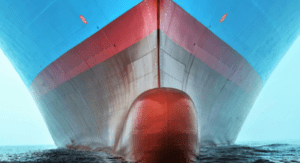 In an interview with American Shipper, Patrik Berglund, CEO of Xeneta, a company that tracks both long- and short-term ocean shipping rates, said that “we’re going into a tender season that doesn’t look like anything else historically.” What Berglund is referring to is the advantage that shipping lines hold for negotiations with cargo shippers for 2022 and beyond. Essentially, this is the contracts that determine what American importers will pay over the coming year, and increasingly, multiple years. In the first half of last year, the average Asia-West Coast long-term rate was around $3,000 per forty-foot equivalent unit. By October, it was up to $6,000-$6,500 per FEU. “For 2022, we see $7,000-$8,000 as an early indicator,” said Berglund. Xeneta currently puts the Asia-West Coast spot rate at just under $10,000 per FEU, with some cargoes paying additional priority shipment fees of $1,400-$7,500. That brings the max spot rate to around $17,500, and the spread versus the cheapest, lower end of contract rates to around $14,500 per FEU.
In an interview with American Shipper, Patrik Berglund, CEO of Xeneta, a company that tracks both long- and short-term ocean shipping rates, said that “we’re going into a tender season that doesn’t look like anything else historically.” What Berglund is referring to is the advantage that shipping lines hold for negotiations with cargo shippers for 2022 and beyond. Essentially, this is the contracts that determine what American importers will pay over the coming year, and increasingly, multiple years. In the first half of last year, the average Asia-West Coast long-term rate was around $3,000 per forty-foot equivalent unit. By October, it was up to $6,000-$6,500 per FEU. “For 2022, we see $7,000-$8,000 as an early indicator,” said Berglund. Xeneta currently puts the Asia-West Coast spot rate at just under $10,000 per FEU, with some cargoes paying additional priority shipment fees of $1,400-$7,500. That brings the max spot rate to around $17,500, and the spread versus the cheapest, lower end of contract rates to around $14,500 per FEU.
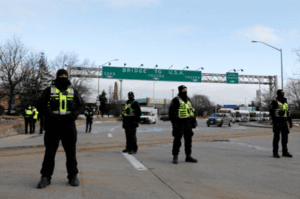 Last week, I wrote about the ongoing situation at the Ambassador Bridge, the busiest land border crossing between the US and Canada. The bridge carries 25 percent of trade between the US and Canada, and there were growing fears that a lengthy impasse would be likely to send layoffs rippling through factories in both countries. The Canada Border Service Agency confirmed the opening of the bridge early Monday morning, but it advised against any nonessential travel. A court ordered protesters to end their blockade by 7 pm Friday, but not all left. Authorities warned that remaining protesters would be subject to arrest. On Saturday, police ticketed and towed vehicles and arrested at least one person; by early Sunday, the protest had shrunk to just about a dozen protesters. The bridge reopened late Sunday after police cleared and arrested a lingering group of protesters demonstrating against COVID-19 vaccine mandates.
Last week, I wrote about the ongoing situation at the Ambassador Bridge, the busiest land border crossing between the US and Canada. The bridge carries 25 percent of trade between the US and Canada, and there were growing fears that a lengthy impasse would be likely to send layoffs rippling through factories in both countries. The Canada Border Service Agency confirmed the opening of the bridge early Monday morning, but it advised against any nonessential travel. A court ordered protesters to end their blockade by 7 pm Friday, but not all left. Authorities warned that remaining protesters would be subject to arrest. On Saturday, police ticketed and towed vehicles and arrested at least one person; by early Sunday, the protest had shrunk to just about a dozen protesters. The bridge reopened late Sunday after police cleared and arrested a lingering group of protesters demonstrating against COVID-19 vaccine mandates.
 Sustainability continues to be top of mind for companies. By 2030, the Coca-Cola Co. aims to have at least 25 percent of all beverages globally across its portfolio of brands sold in refillable / returnable glass or plastic bottles, or in refillable containers through traditional fountain or Coca-Cola Freestyle dispensers. The company’s World Without Waste initiative remains focused on its three core pillars: Design, Collect, and Partner.
Sustainability continues to be top of mind for companies. By 2030, the Coca-Cola Co. aims to have at least 25 percent of all beverages globally across its portfolio of brands sold in refillable / returnable glass or plastic bottles, or in refillable containers through traditional fountain or Coca-Cola Freestyle dispensers. The company’s World Without Waste initiative remains focused on its three core pillars: Design, Collect, and Partner.
- Design: make all primary consumer packaging recyclable by 2025 and use 50 percent recycled material in our packaging by 2030.
- Collect: collect and recycle a bottle or can for every bottle or can sold by 2030.
- Partner: bring people together to support a healthy, debris-free environment.
By increasing its use of reusable packaging, the company says it promotes a circular economy as refillable containers have high levels of collection and are low-carbon footprint beverage containers, because the container collection is built into the beverage delivery model.
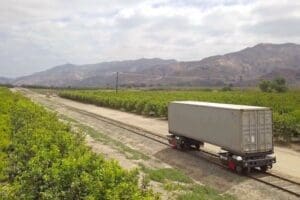 Autonomous vehicles continue to evolve with improved technology making autonomous supply chains closer to reality. Three former SpaceX engineers have founded Parallel Systems, a firm specializing in autonomous battery-powered electric rail vehicles for shipping and freight. Small autonomous vehicles will hold up cargo, like shipping containers, and allow it to be transported on railway tracks just like larger trains do. Since they’re individually powered, the railcars can be joined together to create a larger fleet or split off to multiple destinations with the cargo in hand. It also means that they’re more flexible, as the “platoons” won’t need to meet a certain amount of cargo before they can start moving. According to reports, the vehicles can carry up to 128,000 pounds, which is double what a semi-truck can carry, and each can travel individually for up to 500 miles.
Autonomous vehicles continue to evolve with improved technology making autonomous supply chains closer to reality. Three former SpaceX engineers have founded Parallel Systems, a firm specializing in autonomous battery-powered electric rail vehicles for shipping and freight. Small autonomous vehicles will hold up cargo, like shipping containers, and allow it to be transported on railway tracks just like larger trains do. Since they’re individually powered, the railcars can be joined together to create a larger fleet or split off to multiple destinations with the cargo in hand. It also means that they’re more flexible, as the “platoons” won’t need to meet a certain amount of cargo before they can start moving. According to reports, the vehicles can carry up to 128,000 pounds, which is double what a semi-truck can carry, and each can travel individually for up to 500 miles.
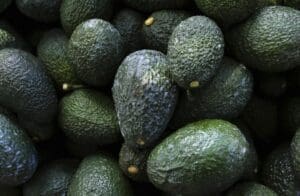 Mexico has acknowledged that the US government has suspended all imports of Mexican avocados after a US plant safety inspector in Mexico received a threat. While the surprise, temporary suspension was confirmed late Saturday on the eve of the Super Bowl, it did not affect game-day consumption since those avocados had already been shipped. Avocado exports are the latest victim of the drug cartel turf battles and extortion of avocado growers in the western state of Michoacan, the only state in Mexico fully authorized to export to the US market. The US government suspended all imports of Mexican avocados “until further notice” after a US plant safety inspector in Mexico received a threatening message, Mexico’s Agriculture Department said in a statement. The import ban came on the day that the Mexican avocado growers and packers association unveiled its Super Bowl ad for this year. Mexican exporters have taken out the pricey ads for almost a decade in a bid to associate guacamole as a Super Bowl tradition.
Mexico has acknowledged that the US government has suspended all imports of Mexican avocados after a US plant safety inspector in Mexico received a threat. While the surprise, temporary suspension was confirmed late Saturday on the eve of the Super Bowl, it did not affect game-day consumption since those avocados had already been shipped. Avocado exports are the latest victim of the drug cartel turf battles and extortion of avocado growers in the western state of Michoacan, the only state in Mexico fully authorized to export to the US market. The US government suspended all imports of Mexican avocados “until further notice” after a US plant safety inspector in Mexico received a threatening message, Mexico’s Agriculture Department said in a statement. The import ban came on the day that the Mexican avocado growers and packers association unveiled its Super Bowl ad for this year. Mexican exporters have taken out the pricey ads for almost a decade in a bid to associate guacamole as a Super Bowl tradition.
![]() Grubhub announced the launch of convenience store delivery in partnership with 7-Eleven, joining other third-party delivery services like DoorDash that have made the foray into service outside of restaurant partnerships. After a pilot test in New York City, Grubhub Goods is expanding to 3,000 locations around the country — covering most of Grubhub’s markets — and offering items for delivery like energy drinks, toiletry items, and snacks delivered by Grubhub drivers. Unlike the recent DoorDash offering, which allows customers to piggyback convenience store runs on top of their original restaurant order, Grubhub requires separate orders for restaurant and convenience products. In celebration of this new partnership, Grubhub is offering customers 50 percent off orders $15 or more.
Grubhub announced the launch of convenience store delivery in partnership with 7-Eleven, joining other third-party delivery services like DoorDash that have made the foray into service outside of restaurant partnerships. After a pilot test in New York City, Grubhub Goods is expanding to 3,000 locations around the country — covering most of Grubhub’s markets — and offering items for delivery like energy drinks, toiletry items, and snacks delivered by Grubhub drivers. Unlike the recent DoorDash offering, which allows customers to piggyback convenience store runs on top of their original restaurant order, Grubhub requires separate orders for restaurant and convenience products. In celebration of this new partnership, Grubhub is offering customers 50 percent off orders $15 or more.
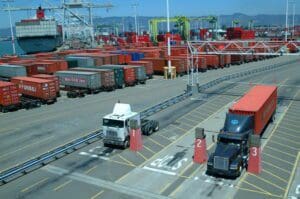 The ongoing freight backups at maritime ports is disrupting global supply chains. The port backups have resulted in some of the world’s biggest ocean shipping lines buying cargo planes. The state of California moved yesterday to alleviate the persistent backup of freight imports at maritime ports by announcing a deal to lease space at six state-owned sites with enough capacity to store 20,000 shipping containers and clear valuable space at ocean-side docks. State leaders identified the locations through a deal with Chunker, a Utah-based firm that provides a marketplace for trading short-term, on-demand warehouse space. Chunker’s role in the deal was to lease the six sites from the California Department of General Services for one year, with an option for a second year. They include three armories (in Lancaster, Palmdale, and Stockton), two fairground sites (San Joaquin County and Antelope Valley Fairgrounds), and a former prison site (Deuel Vocational Institute in Tracy).
The ongoing freight backups at maritime ports is disrupting global supply chains. The port backups have resulted in some of the world’s biggest ocean shipping lines buying cargo planes. The state of California moved yesterday to alleviate the persistent backup of freight imports at maritime ports by announcing a deal to lease space at six state-owned sites with enough capacity to store 20,000 shipping containers and clear valuable space at ocean-side docks. State leaders identified the locations through a deal with Chunker, a Utah-based firm that provides a marketplace for trading short-term, on-demand warehouse space. Chunker’s role in the deal was to lease the six sites from the California Department of General Services for one year, with an option for a second year. They include three armories (in Lancaster, Palmdale, and Stockton), two fairground sites (San Joaquin County and Antelope Valley Fairgrounds), and a former prison site (Deuel Vocational Institute in Tracy).
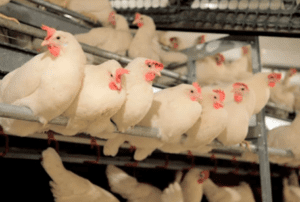 The words “avian flu” often trigger alarm bells for the majority of the population, as was evident with the avian flu outbreaks in the US that led to the culling of hundreds of thousands of chickens and turkeys in 2015 and 2017. Well, the avian flu looks like it is back. Poultry operations in Kentucky and Virginia were confirmed to have birds infected with a highly lethal form of avian flu, federal agriculture officials said Monday, days after a flock of turkeys in Indiana tested positive, raising worries about a wider outbreak in the country. The infections come after 29,000 turkeys were destroyed in Indiana once officials detected the presence of highly pathogenic avian influenza, or HPAI, last week in Dubois County. Federal officials said the Indiana outbreak was the first confirmed case in commercial poultry in the United States since 2020. Avian influenza doesn’t pose a public health risk to humans, US agriculture officials said, so long as poultry and eggs are properly cooked at internal temperatures above 165 degrees. However, it does bring about the risk of supply shortages, leading to higher prices.
The words “avian flu” often trigger alarm bells for the majority of the population, as was evident with the avian flu outbreaks in the US that led to the culling of hundreds of thousands of chickens and turkeys in 2015 and 2017. Well, the avian flu looks like it is back. Poultry operations in Kentucky and Virginia were confirmed to have birds infected with a highly lethal form of avian flu, federal agriculture officials said Monday, days after a flock of turkeys in Indiana tested positive, raising worries about a wider outbreak in the country. The infections come after 29,000 turkeys were destroyed in Indiana once officials detected the presence of highly pathogenic avian influenza, or HPAI, last week in Dubois County. Federal officials said the Indiana outbreak was the first confirmed case in commercial poultry in the United States since 2020. Avian influenza doesn’t pose a public health risk to humans, US agriculture officials said, so long as poultry and eggs are properly cooked at internal temperatures above 165 degrees. However, it does bring about the risk of supply shortages, leading to higher prices.
That’s all for this week Enjoy the weekend and the song of the week, Don Henley’s Dirty Laundry.

















